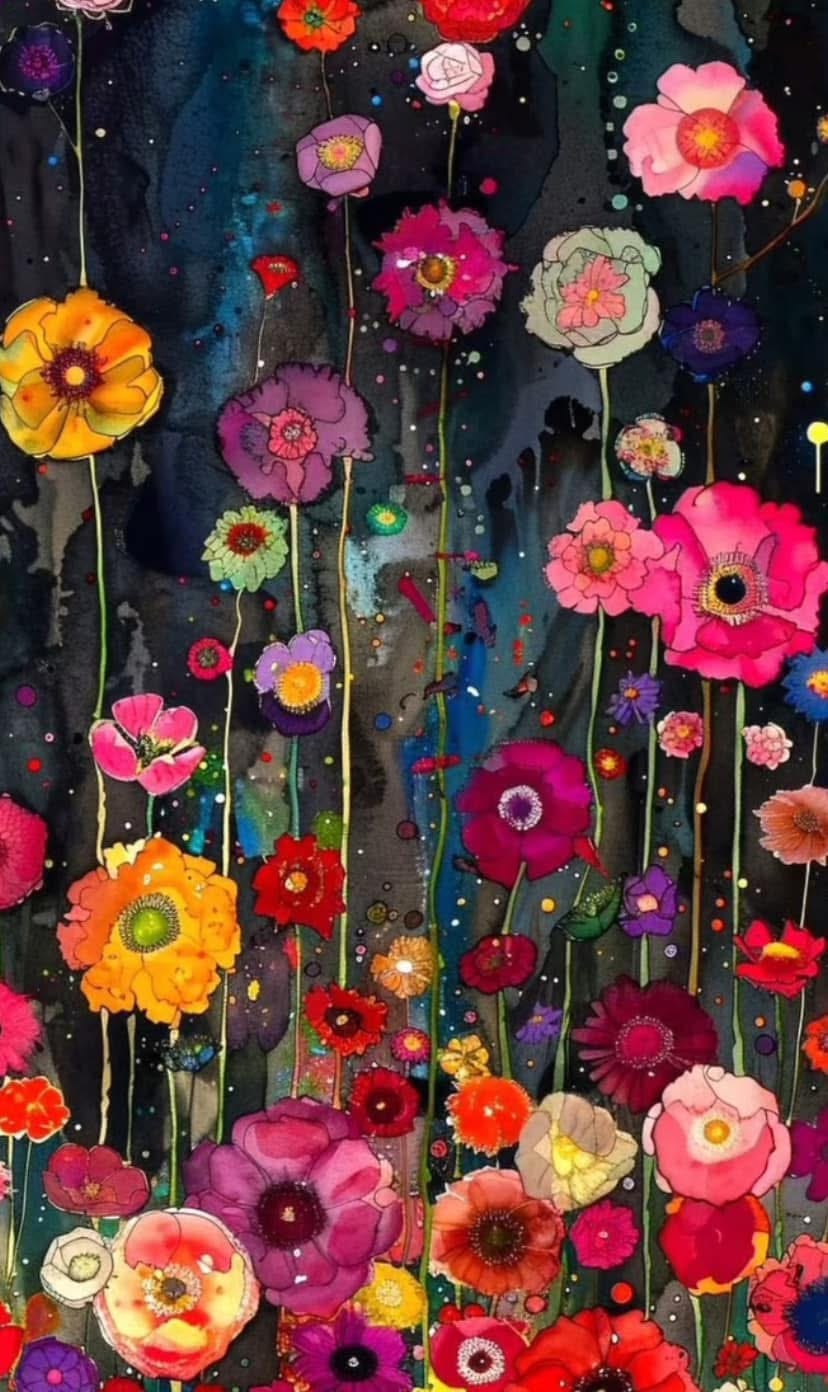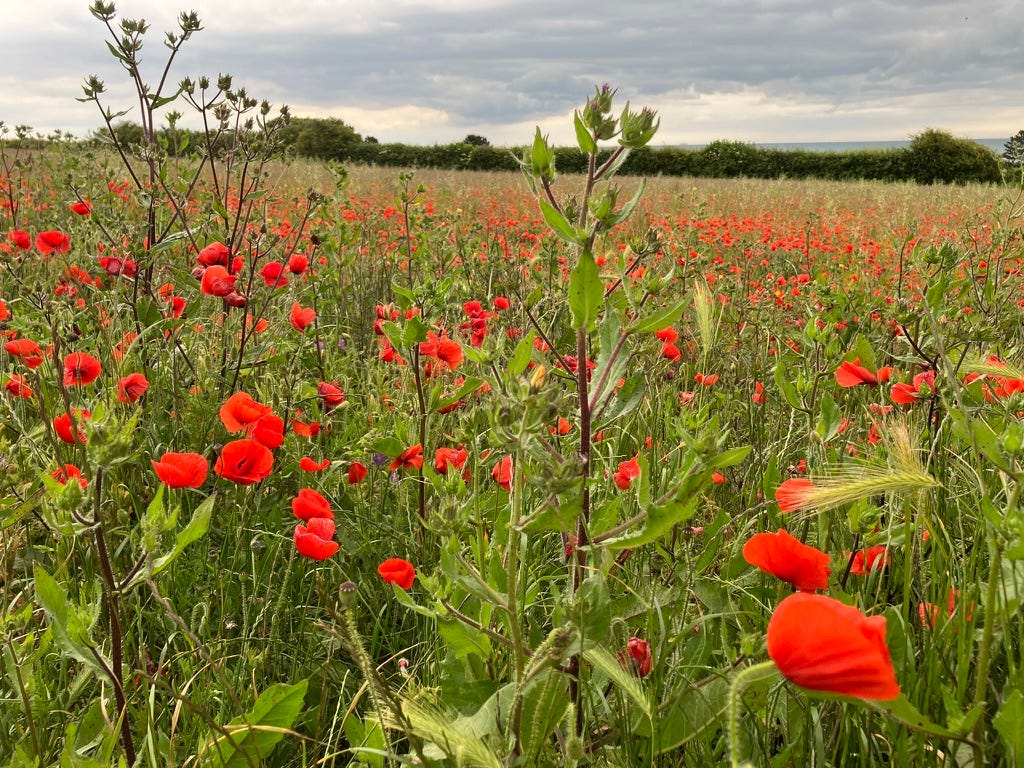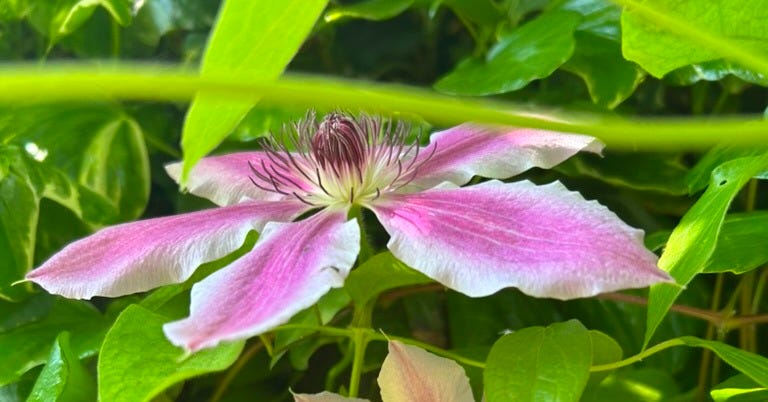🌹 🎶 Flower Power
A rosy ramble under the light of the Flower Moon
“I myself in summer hours wove together flowers”
- Sappho, Ancient Greek Poet (c610-570)
As the Flower Moon blooms, gliding over treetops and fields crowned with May flowers, she takes a long view from the furthest point in her orbit of Earth. When we zoom in on flowers, we enter a delicate, petalled world travelled by bees; when we zoom out, we see the intricate interweaving of flower power with people and planet.
From birth to death, whenever we wish to woo, comfort, reward or remember someone, we give them their flowers. We deck athletes, artists, leaders, wedding couples and statues in garlands and adorn doorways and graves with wreaths. Studies show that the flowers we gift to those who are ill or grieving help lower blood pressure and stress levels, boosting mood and resilience. As the root of the word flower, *bhel- means to thrive or bloom, so this full moon illuminates the warp and weft of floral magic within life’s tapestry.
Rose Garden at St Mark’s Church, Clerkenwell
Crespescule - e.e. cummings (1917)
First published in 1917 in Eight Harvard Poets, edited by L.J. Gomme.
Whilst The Bible reminds us that the lilies of the field do not toil, flowers are constantly engaged in life-giving processes. Without flowers, there would be no seeds, fruits or honey, and multiple species of plants and trees would disappear. Fecund fertilisers, their petalled pollen palaces seduce bees, wasps, moths, butterflies, birds, bats and even lizards into becoming pollinators. No wonder, then, that humans are forever falling in love - and saying it - with flowers.
“What's in a name? That which we call a rose, By any other word would smell as sweet,” - so says one of the world’s most famous tragic lovers, Juliet. Since antiquity, humans have ascribed names and meaning to flowers - the Victorians dedicated books, such as Kate Greenaway’s Floral poetry and the language of flowers (1877) to decoding the meaning of bouquets and posies. Rambling earth for 30-40 million years and first cultivated in China 5000 years ago, the rose has played Cupid for centuries. Every Valentine’s Day, an estimated 8 million red roses are grown and flown to the UK, mostly from the Netherlands and Kenya, generating a thorny carbon footprint. Our long-rooted rosy romance interweaves the intoxicatingly beautiful and painfully sharp aspects of love.
The Garden by Moonlight
A black cat among roses,
Phlox, lilac-misted under a first-quarter moon,
The sweet smells of heliotrope and night-scented stock.
The garden is very still,
It is dazed with moonlight,
Contented with perfume,
Dreaming the opium dreams of its folded poppies.
Firefly lights open and vanish
High as the tip buds of the golden glow
Low as the sweet alyssum flowers at my feet.
Moon-shimmer on leaves and trellises,
Moon-spikes shafting through the snow ball bush.
Only the little faces of the ladies’ delight are alert and staring,
Only the cat, padding between the roses,
Shakes a branch and breaks the chequered pattern
As water is broken by the falling of a leaf.
Then you come,
And you are quiet like the garden,
And white like the alyssum flowers,
And beautiful as the silent sparks of the fireflies.
Ah, Beloved, do you see those orange lilies?
They knew my mother,
But who belonging to me will they know
When I am gone.
- Amy Lowell - American Poet 1874 – 1925 Pictures of the Floating World (1919)
Within my parents’ garden, flowers bloom with many petalled memories. The toil of my deaf maternal grandmother’s signing hands is embedded in plants from her garden. Memories of childhood leafy explorations in my paternal grandparents’ garden smile from the gold, fluffy faces of a plant I call Grandfather’s Buttons. As an urban flat dweller, I fill my window boxes with lavender because it reminds me of the Lavender Field near my parents’ home. Amongst my family and friends, sharing seeds, cutting and plants is a way of passing on and preserving love and memory.
The brief, beautiful and intensely purposeful existence of flowers zooms us in on the fragility of our individual lives, whilst zooming us out to connect with natural cycles. The lotus, which thrives in muddy waters, unfolding its petals in the morning light and closing at night, symbolised creation and rebirth for Ancient Egyptians and purification and enlightenment for Buddhists. E.E. Cummings’ sensual poem Crespescule was written two years after John McCrae’s poem In Flanders Fields (1915), immortalised the poppy as a collective symbol of bloodshed and remembrance.
Poppy Fields near Deal
“I will not give up the flowers in my heart for stones just because the world is a hard place.
The world is only hard because it needs more flower-hearted people.”
― Nikita Gill, Irish-Indian Poet
Published in Dragonhearts (2019) a collection with Amanda Lovelace & Trista Mateer
Insisting that “the worker must have bread, but she must have roses, too,” in 1911, Polish-born textile worker Rose Schniederman led a strike which won pay increases and better working conditions for women working in mills across New England. Rose’s vision of a fairer world where all can flower sings on in settings of James Oppenheim’s poem by Mimi Farina, Joan Baez’s sister and folk singer Judy Collins.
Half a century later, poet Allen Ginsburg called for “Masses of flowers — a visual spectacle — especially concentrated in the front lines,” of protests against the Vietnam War. “The cry of 'Flower Power' echoes through the land. We shall not wilt,” declared Abbie Hoffman after a Flower Power Brigade was violently suppressed, and during the March on the Pentagon (1967) protestors placed blooms in the barrels of rifles of militia. John Lennon remarked, "Okay, Flower Power didn't work, so we start again. Apathy doesn't count. Even singing is better than doing nothing."
As we face the frontlines of conflict - whether on the boundaries of our personal space or along the fault lines of political, religious and cultural identities - it’s good to ponder what would happen if we offered flowers instead of incendiaries. In 1914, German soldiers singing Stille Nacht, Silent Night were joined by English soldiers in No Man’s Land where they exchanged gifts and songs. As flowerings of the human spirit, our songs and stories can help us thrive and bloom, offering enlivening, empowering, empathetic experiences of beauty, even in the most oppressive of situations.









Gorgeous, Katie! And lovely to be reminded of our walk through the poppy field last year!
Katie this is wonderful writing, thank you. I enjoyed the mix of your thoughts, others' poetry and the flowery facts you have woven through this piece. I am fascinated by etymology and did not know that about the 'root' of flowers! Thank you.